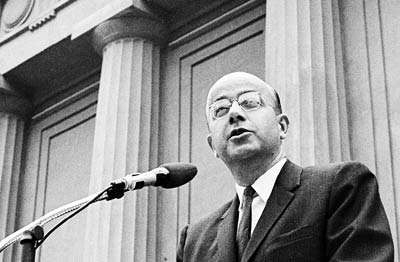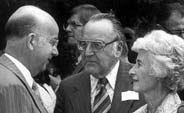UC Berkeley Press Release
 |
Clark Kerr at
the Greek Theatre podium at a special convocation
called by department chairmen on Dec. 7, 1964. (Steven
Marcus photo) |
Former UC President Clark Kerr, a national leader in higher education, dies at 92
BERKELEY – Clark Kerr, a towering figure in higher education, died Monday, Dec. 1 at the age of 92. As president of the University of California, he was chief architect of the master plan that guided California public higher education for four decades and is still a national model.
 More on Clark Kerr |
| • Kerr's legacy: Master Plan transformed
higher education • Tributes from academia • Excerpts from obituaries in the nation's papers • The Worth of Intellect: Kerr's inaugural address as UC president Sept. 29, 1958 • Loyalty Oath and the Free Speech Movement: An oral history September 1969 • Higher Education in Perspective: Kerr previews the inauguration of Robert Berdahl as UC Berkeley's eighth chancellor April 1998 |
Kerr died peacefully in his sleep at his home in El Cerrito, Calif. His death followed complications from a fall sustained about two weeks ago, according to his family.
Kerr, who also served as UC Berkeley’s first chancellor, was admired as an elegant thinker of great intellect. His clear, logical vision of both the promise and problems of modern higher education influenced generations of political and education leaders, from California Gov. Edmund G. "Pat" Brown to Presidents Eisenhower, Kennedy and Johnson.
Following publication of the Master Plan for Higher Education in California, Time magazine featured Kerr on its cover on Oct. 17, 1960, chronicling his inspired leadership and deft guidance of the growing UC system.
Although born in an era when fewer than 5 percent of America’s 18-year-olds attended college, the former Pennsylvania farm boy believed that every student should be entitled to a college education, whether or not his or her family could afford it. On a national level, his vision is credited with launching what has become the Pell Grant program, the foundation of need-based federal support for college students.
"Every student and every campus leader alive today owes Clark Kerr a great debt of gratitude – for it was his vision and his bold determination that helped create the modern university, and the idea that students from all walks of life should have access to college," said David Ward, president of the American Council on Education and former chancellor of the University of Wisconsin at Madison.
In his influential book, "The Uses of the University," published in 1963, Kerr laid out his views that the large modern university, or "multiversity," as he called it, had to operate as a part of society, no longer as an ivory tower apart from it. The slim volume has been translated into many languages, including Italian, Japanese, Urdu and Arabic.
| 'Clark Kerr ... simultaneously built the world's
greatest public university system, while looking after
the interests
and the values
of all higher education segments' -Barry Munitz, former
CSU chancellor
|
"The very special genius of Clark Kerr was that he simultaneously built the world's greatest public university system, while looking after the interests and the values of all higher education segments. For 37 years, I had the personal privilege of learning from him, particularly watching how he fought without compromise but with elegant skill to look after the interests of all segments of American society," said Barry Munitz, president and CEO of the J. Paul Getty Trust and former chancellor of the California State University system.
UC Berkeley Chancellor Robert M. Berdahl said that Kerr was "one of the most revered leaders in public higher education in the 20th century. Every chancellor of Berkeley, every president of the University of California, I think, consulted with Clark because he kept abreast of everything that was happening on the campus. He was really a remarkable influence well beyond his tenure as chancellor and president because of his devotion to the university, his great concern about it."
A professor of economics and industrial relations and a masterful labor negotiator, Kerr joined the UC Berkeley faculty in 1945 as a flood of post-war servicemen and women enrolled. What this generation of students did with the opportunities afforded them by the GI Bill of Rights would have a deep impact on Kerr’s insistence on universal access to higher education.
Kerr rose to prominence on the faculty during a particularly tense time in the university’s history. As the Cold War heated up, the University of California Board of Regents threatened to fire all professors who refused to sign a loyalty oath.
Some faculty members refused to do so, and Kerr, then a junior member of the Academic Senate Committee on Privilege and Tenure, was a forceful and reasoned advocate for the faculty position before the UC Regents. In 1952, when he was selected to be the campus’s first chancellor, Kerr was the choice of the faculty nominating committee.
"He just didn’t stand for the principles of reason and evidence, he embodied them. We didn’t work with him to influence him, we worked with him to learn from him," said Martin Trow, chair emeritus of UC Berkeley’s Goldman School of Public Policy and former director of the Center for Studies in Higher Education at UC Berkeley.
Kerr’s dry sense of humor made him among the most quoted university leaders in the country. To this day, hardly a student arrives at UC Berkeley without hearing at least once Kerr’s observation: "If you are bored with Berkeley, you are bored with life."
But it was his comment at a faculty meeting in 1957 that found its way into Time and Playboy magazines and into university lore. Asked what the chancellor was doing about parking, he replied that the chancellor’s job had come to be defined as "providing parking for faculty, sex for the students, and athletics for the alumni."
Kerr served as UC Berkeley chancellor from 1952 to 1958, when he was elevated to president of the University of California system. He served in that role until 1967. It was an era of tremendous growth, planning and student unrest.
| 'He was the dean of the higher education community
not only in California, but in America, and we will be
forever in his debt for the extraordinary contributions
he made to educational excellence and opportunity.' -UC President Robert
Dynes
|
When Kerr became UC president, UC Berkeley and UCLA were the primary campuses with specialized instruction offered at other campuses located around the state. By the time he departed in 1967, the nine-campus UC system was in place, and enrollment had doubled to 87,000 students. During his tenure, he oversaw the addition of the UC Irvine, UC San Diego and UC Santa Cruz campuses.
"I stood for diversity within the University of California. Rather than having one or two enormous campuses, we should have several campuses distributed around the state of reasonable size, serving the major communities of the state. Each one should be different—have its own personality, its own special character, its own sense of identity," Kerr said.
As UC president, he also spearheaded the negotiation of California's Master Plan for Higher Education. Adopted by the state Legislature in 1960 with only one dissenting vote, it assured access to public higher education for all California students and defined the roles of the UC campuses, California State University and California's system of community colleges. The plan has been used as a model in education planning around the world.
"Clark Kerr was a giant in American higher education, and the entire University of California community joins in mourning his loss," said UC President Robert C. Dynes. "He was the dean of the higher education community not only in California, but in America, and we will be forever in his debt for the extraordinary contributions he made to educational excellence and opportunity."
As Kerr summed up his UC presidency at a 1967 news conference, he spoke of his accomplishments: "In the history of the university, we've never turned away a qualified student from the State of California; I hope we never do. It will be a sad day when that happens."
But for all his successes, Kerr struggled with growing student unrest, which reached historic dimensions with the Free Speech Movement that rocked the Berkeley campus beginning in 1964. It accelerated student activism on a national scale, but its tumultuous conclusion marked the low point in Kerr’s storied UC career as he was caught between increasingly liberal students and conservative politicians.
Students protested a decision by the Berkeley administration to shut down a section of the Bancroft/Telegraph corner because student activities there violated a rule prohibiting the on-campus raising of funds and recruiting of participants for political activities off campus. That sparked a prolonged confrontation that ended with the mass arrest of 800 students who had taken over the administration building, Sproul Hall. Kerr ultimately persuaded the UC Regents to allow political activities and demonstrations on campus.
His actions, however, ran counter to the direction of the conservative leadership of the UC Regents and, in 1966, of the newly elected Republican governor, Ronald Reagan. In January 1967, three weeks after Reagan took office, the Regents dismissed Kerr. Kerr later quipped that he came into the job as president "fired with enthusiasm" and left the same way. But those who knew him said that, even his final years, he was hurt by the way things worked out.
Neither Kerr’s career nor his influence in higher education ever ended. Kerr was appointed to head the influential Carnegie Commission on Higher Education from 1967-73 and its successor, the Carnegie Council on Policy Studies in Higher Education, until 1979.
Born in 1911 in Stony Creek, Penn., Kerr attended a one-room school as a youngster. He headed off to Swarthmore, a Quaker college, where he earned his B.A. in 1932, was the student body president and became a lifelong follower of the Society of Friends.
He intended to attend law school at Columbia University, but a summer peace caravan to California changed his mind. Taken with California, he enrolled to study economics at Stanford University, where he received his M.A. in 1933. He received his Ph.D. in economics from UC Berkeley in 1939 following a year as a UC Newton Booth Fellow studying at the London School of Economics.
Kerr chose to enter an emerging field, labor economics. He became a well-known, highly regarded labor negotiator. He returned to UC Berkeley in 1945 to head the new Institute of Industrial Relations, a pet project of then-Gov. Earl Warren.
Kerr met Catherine "Kay" Spaulding at a student meeting near UCLA in 1934. The meeting was dominated by Communist Party speakers. She passed him a note, "Are you a communist?" He said, "No." She wrote back, "I’m not either." They were married that year on Christmas Day.
Kerr’s granddaughter, Amber Kerr, 24, is a graduate student in the energy and resources group at UC Berkeley. "What I remember most about him was his extraordinary kindness and his extraordinary fairness. He treated everyone with so much respect and consideration even in the very difficult situations he had to handle through his career. He did a remarkable job in trying to be fair to both sides. This came through in the family as well. He was always the peace maker in the family," she said.
Kerr is survived by his wife, Catherine; two sons, Clark E. Kerr of Alamo, Calif., and Alexander "Sandy" Kerr of Australia; daughter, Caroline Gage of Orinda, Calif.; and William "Bill" Kerr, a half brother living in Pennsylvania. He also leaves seven grandchildren and one great-grandchild.
A campus memorial is planned for early next year. Donations
in Kerr's memory may be made to the Clark Kerr Memorial
Fund, c/o University Relations, University of California,
Berkeley, 2440 Bancroft Way, Room 100, Berkeley,
CA 94720. Checks earmarked for the fund should be made
payable to the UC Berkeley Foundation.

